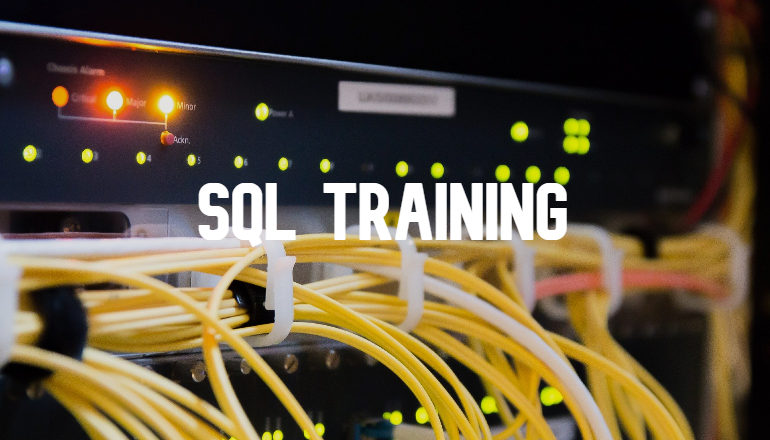SQL Training

- What is SQL Training?
Structured Query Language is a space explicit language utilized in programming and intended for overseeing information held in a social data set administration framework (RDBMS), or for stream preparation in a social information stream the board framework (RDSMS). It is especially helpful in taking care of structured information, for example information joining relations among elements and factors.
SQL offers two primary points of interest over more established read–compose APIs, for example, ISAM or VSAM. Right off the bat, it presented the idea of getting to numerous records with one single order. Also, it wipes out the need to determine how to arrive at a record, for example with or without a file.
Initially dependent on social polynomial math and tuple social analytics, SQL comprises of numerous sorts of statements, which might be casually classed as sublanguages, regularly: an information query language (DQL), an information definition language (DDL), an information control language (DCL), and an information control language (DML). The extent of SQL incorporates information query, information control (addition, refresh and erase), information definition (pattern creation and adjustment), and information access control. In spite of the fact that SQL is basically a revelatory language, it likewise incorporates procedural components.
- Why use SQL Training?
SQL was one of the main business languages to use Edgar F. Codd’s social model. The model was portrayed in his persuasive 1970 paper, “A Relational Model of Data for Large Shared Data Banks”. Despite not altogether clinging to the social model as depicted by Codd, it turned into the most generally utilized information base language. SQL turned into a norm of the American National Standards Institute (ANSI) in 1986, and of the International Organization for Standardization (ISO) in 1987. Since then, the standard has been changed to incorporate a bigger arrangement of highlights. Notwithstanding the presence of principles, most SQL code needs probably a few changes prior to being ported to various data set frameworks.
SQL usage is inconsistent among merchants and doesn’t really totally adhere to principles. Specifically, date and time grammar, string connection, NULLs, and examination case affectability differ from merchant to seller. Famous executions of SQL ordinarily discard essential highlights of Standard SQL, for example, the DATE or TIME information types. The most evident such models, and unexpectedly the most well-known business and restrictive SQL DBMSs, are Oracle (whose DATE carries on as DATETIME, and does not have a TIME type and MS SQL Server (before the 2008 rendition. Accordingly, SQL code can once in a while be ported between data set frameworks without adjustments.
- Important Materials
- E-books
Joe Celko’s SQL for Smarties by Joe Celko –
https://drive.google.com/file/d/1xdlREc4WQWKexNXyoyrf7irRCzHoLqoB/view?usp=sharing
Murach’s Oracle SQL and PL SQL by Joel Murach –
https://drive.google.com/file/d/17JNLZYIt3337wjTeVfwXGgZkE8JNMB5j/view?usp=sharing
Practical SQL: A Beginner’s Guide to Storytelling with Data by Anthony DeBarros –
https://drive.google.com/file/d/1QdjrHu1PqcY6tEcolsAKYLPEMHujA4l9/view?usp=sharing
SQL Primer: An Accelerated Introduction to SQL Basics by Rahul Batra –
https://drive.google.com/file/d/1GPK3nERKP5NiYA5Q4CzKVa9KiMlcJoFO/view?usp=sharing
Beginning Oracle SQL for Oracle Database 12c, 3 edition –
https://drive.google.com/file/d/1h5bqO99n8zb62OLsBQGMYxChTpCeMfRW/view?usp=sharing
- Videos
- SQL basics for Beginners – https://youtu.be/zbMHLJ0dY4w
- SQL Training – https://youtu.be/JTDK6r1GuUU
- SQL Server Tutorial For Beginners – https://youtu.be/-EPMOaV7h_Q
- SQL Server Tutorial For Beginners in Hindi – https://youtu.be/1dWCqjhvF58
- How to use loop in SQL Server – https://youtu.be/ncIO4Ew-0jQ
- Tips for SQL training
SQL stands for Structure Query Language that allows the developer to communicate with the database to modify, delete, insert in the database. With the increase of data analysis, the demand for SQL developers has also increased which results in an increase in the number of people mastering SQL. Below are the tips for a beginner to get started with SQL:
- Understand SQL: Most of the people get confused with different terms used in SQL like RDBMS, DBMS, RA, DB. Before getting started with SQL, users should be aware of different terminologies used in SQL.
- Online Resources: Being a beginner, learning a database language can be a little bit tough to understand but there are plenty of online free resources to help you out.
- Understanding Error Codes: Unlike other programming languages like C, C++, Java, Python, the error code produced in SQL is a little different. One of the most important things to do when writing SQL code is to understand its error message.
- Selecting Database System: Though there are plenty of free database systems available in the market which support SQL, selecting a right database system is a tedious task for a developer. Being a beginner, it is always recommended to start with the MySQL database system.
